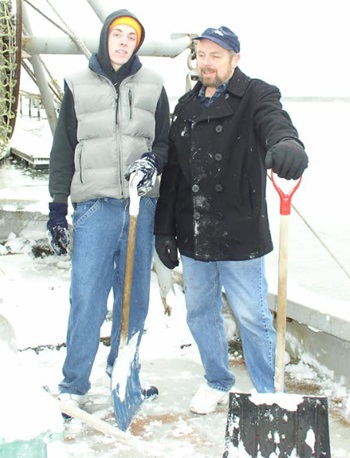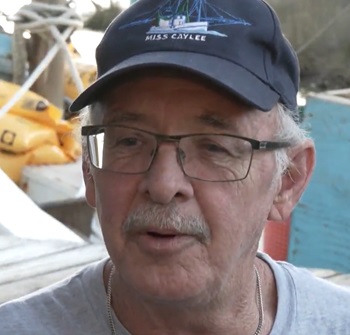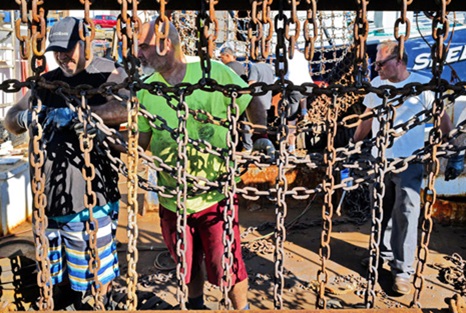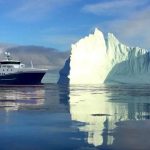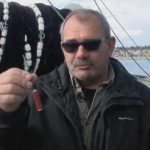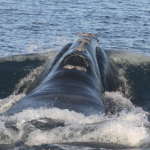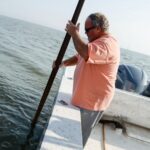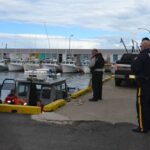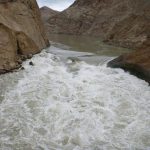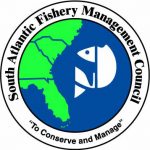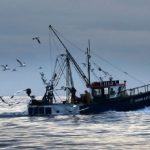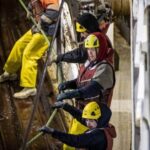Category Archives: South Atlantic
‘Tariffs not enough’ to save U.S. shrimping industry
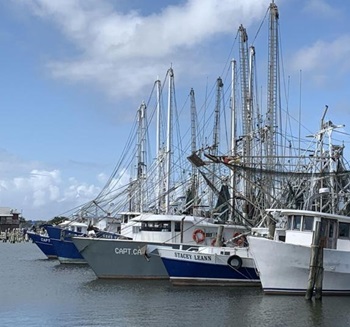 Alan Gibson, president of Tideland Seafood, summed up the frustration at a recent Louisiana Shrimp Task Force hearing in Houma. “Tariffs aren’t enough,” Gibson said. “The decrease in import prices is because of oversupply. They’re competing against each other to sell market share, and we’re fighting them, who are fighting each other.” Gibson called for a 25% import quota, saying it could reduce foreign competition enough to restore balance to the market. David Chauvin, a Louisiana-based seafood company owner, highlighted the disparity. Unlike tariffs, quotas directly limit the volume of imports, addressing the core issue of oversupply. By restricting imports, a quota could help stabilize domestic shrimp prices, allowing U.S. producers to compete more effectively. more, >>CLICK TO READ<< 16:58
Alan Gibson, president of Tideland Seafood, summed up the frustration at a recent Louisiana Shrimp Task Force hearing in Houma. “Tariffs aren’t enough,” Gibson said. “The decrease in import prices is because of oversupply. They’re competing against each other to sell market share, and we’re fighting them, who are fighting each other.” Gibson called for a 25% import quota, saying it could reduce foreign competition enough to restore balance to the market. David Chauvin, a Louisiana-based seafood company owner, highlighted the disparity. Unlike tariffs, quotas directly limit the volume of imports, addressing the core issue of oversupply. By restricting imports, a quota could help stabilize domestic shrimp prices, allowing U.S. producers to compete more effectively. more, >>CLICK TO READ<< 16:58
Endangered whales found entangled in fishing gear off Massachusetts coast
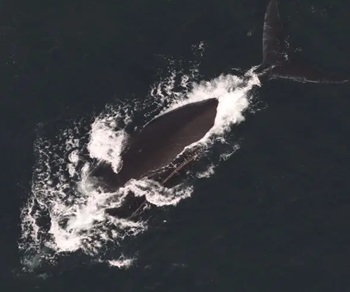 Two endangered whales have been discovered entangled in fishing line off the coast of Massachusetts, the National Oceanic and Atmospheric Administration announced Tuesday, as biologists warned one of the whales is “likely to die.” NOAA said the pair of North Atlantic right whales was found during an aerial survey on Dec. 9, approximately 50 miles southeast of Nantucket. NOAA Fisheries biologists said a juvenile male, #5110, has a thick line that passes across his head and once across his back, leaving him “seriously injured” and likely to die. NOAA said it is currently monitoring the federally protected whales and will determine “if entanglement responses will be possible.” Video, more, >>CLICK TO READ<< 08:11
Two endangered whales have been discovered entangled in fishing line off the coast of Massachusetts, the National Oceanic and Atmospheric Administration announced Tuesday, as biologists warned one of the whales is “likely to die.” NOAA said the pair of North Atlantic right whales was found during an aerial survey on Dec. 9, approximately 50 miles southeast of Nantucket. NOAA Fisheries biologists said a juvenile male, #5110, has a thick line that passes across his head and once across his back, leaving him “seriously injured” and likely to die. NOAA said it is currently monitoring the federally protected whales and will determine “if entanglement responses will be possible.” Video, more, >>CLICK TO READ<< 08:11
Athearn Marine Agency Boat of the Week: 62′ Steel Longliner with Permit, 400HP Cummins
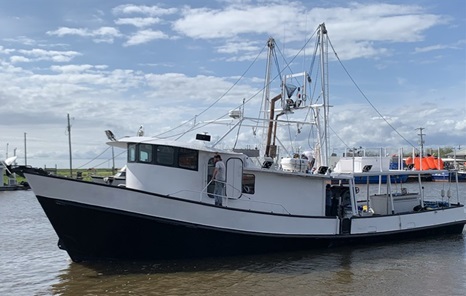 To review specifications, information, and 47 photos’, >click here<. To see all the boats in this series >click here< 06:00
To review specifications, information, and 47 photos’, >click here<. To see all the boats in this series >click here< 06:00
A Rebuttal to a Recent Commentary: Alaska trawl fisheries are vital and under attack by those using myths
 This campaign to ban trawling – a sustainable fishing method responsible for a substantial majority of fishery landings in the Alaska Region and nationally – poses a direct threat to Alaska’s coastal economy, seafood sector and way of life. If you enjoy wild seafood – fish sandwiches or shrimp; fish sticks or scallops; fish tacos or rockfish – you are enjoying seafood caught by “trawl” or “dredge” fishing gears that touch the seafloor. It’s true that these fishing methods, like every farm, aquaculture facility and fishing operation on the planet, impact the environment. But, what’s also true is that the impacts of trawl fishing in Alaska are continually monitored to ensure long-term ecosystem health. The recent commentary authored for the Alaska Beacon by Heather Sauyaq Jean Gordon and David Bayes is the latest effort to demonize sustainable trawl fisheries. Like other attacks on our sector, the commentary comes from a vocal few that play fast and loose with the facts. By Sam Wright, more, >>CLICK TO READ<< 11:43
This campaign to ban trawling – a sustainable fishing method responsible for a substantial majority of fishery landings in the Alaska Region and nationally – poses a direct threat to Alaska’s coastal economy, seafood sector and way of life. If you enjoy wild seafood – fish sandwiches or shrimp; fish sticks or scallops; fish tacos or rockfish – you are enjoying seafood caught by “trawl” or “dredge” fishing gears that touch the seafloor. It’s true that these fishing methods, like every farm, aquaculture facility and fishing operation on the planet, impact the environment. But, what’s also true is that the impacts of trawl fishing in Alaska are continually monitored to ensure long-term ecosystem health. The recent commentary authored for the Alaska Beacon by Heather Sauyaq Jean Gordon and David Bayes is the latest effort to demonize sustainable trawl fisheries. Like other attacks on our sector, the commentary comes from a vocal few that play fast and loose with the facts. By Sam Wright, more, >>CLICK TO READ<< 11:43
Shrimp sham: Investigation finds over 80% of “Gulf shrimp” sold on Mississippi Coast is imported
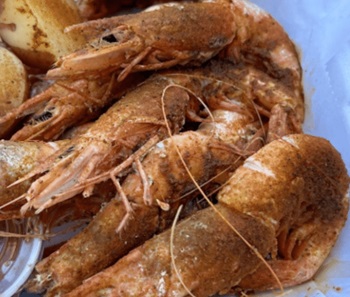 After Mississippi Gulf Coast staple restaurant Mary Mahoney’s Old French House came under fire for fraudulent branding of seafood, a new third-party investigation has found that mislabeling imported seafood is more rule than the exception for the region’s celebrated food scene. SeaD Consulting, a firm that specializes in genetic testing to monitor mislabeling and substitution fraud in the seafood industry, conducted a comprehensive investigation into the potential misrepresentation of shrimp served across coastal Mississippi. “Consumers come to the coast expecting the finest, freshest Gulf seafood, but what they’re being served often falls far short of that,” COO of SeaD Consulting Erin Williams said in a press release. “This isn’t just about mislabeling; it’s about eroding consumer trust, undercutting local business, and threatening the livelihood of hardworking Gulf shrimpers.” more, >>CLICK TO READ<< 10:56
After Mississippi Gulf Coast staple restaurant Mary Mahoney’s Old French House came under fire for fraudulent branding of seafood, a new third-party investigation has found that mislabeling imported seafood is more rule than the exception for the region’s celebrated food scene. SeaD Consulting, a firm that specializes in genetic testing to monitor mislabeling and substitution fraud in the seafood industry, conducted a comprehensive investigation into the potential misrepresentation of shrimp served across coastal Mississippi. “Consumers come to the coast expecting the finest, freshest Gulf seafood, but what they’re being served often falls far short of that,” COO of SeaD Consulting Erin Williams said in a press release. “This isn’t just about mislabeling; it’s about eroding consumer trust, undercutting local business, and threatening the livelihood of hardworking Gulf shrimpers.” more, >>CLICK TO READ<< 10:56The Truth Behind the Menu: Study finds widespread mislabeled shrimp in Coast restaurants
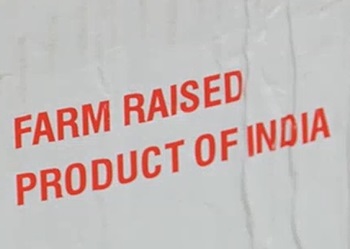 Docked shrimp boats, and empty factories. It’s a sight many in the shrimp industry are dealing with because of the imports flooding the market. “It’s really hard to stay in business, and to stay afloat,” says Ocean Springs Seafood Market Inc. Vice President Bethany Fayard. And it doesn’t help that restaurants are still advertising imported shrimp as domestic. “It’s a dying industry. We have let imports basically hurt the fisherman in Mississippi,” says State Representative Brent Anderson. A seafood consulting group known as SeaD was asked by an unnamed organization to look into this issue. The results were not entirely shocking to Fayard and Anderson, who both push for stricter labeling laws in the state. “In Biloxi, we have a situation which we weren’t coming in to test for, but we discovered quite rapidly, and that is the mislabeling of the Royal Red Shrimp,” says SeaD CEO David Williams. Video, more, >>CLICK TO READ<< 08:52
Docked shrimp boats, and empty factories. It’s a sight many in the shrimp industry are dealing with because of the imports flooding the market. “It’s really hard to stay in business, and to stay afloat,” says Ocean Springs Seafood Market Inc. Vice President Bethany Fayard. And it doesn’t help that restaurants are still advertising imported shrimp as domestic. “It’s a dying industry. We have let imports basically hurt the fisherman in Mississippi,” says State Representative Brent Anderson. A seafood consulting group known as SeaD was asked by an unnamed organization to look into this issue. The results were not entirely shocking to Fayard and Anderson, who both push for stricter labeling laws in the state. “In Biloxi, we have a situation which we weren’t coming in to test for, but we discovered quite rapidly, and that is the mislabeling of the Royal Red Shrimp,” says SeaD CEO David Williams. Video, more, >>CLICK TO READ<< 08:52
First Circuit likely to save the whales despite lobstermen’s complaints
 An epic sea battle unfolded at the First Circuit Tuesday as Massachusetts fishermen tried to harpoon federal regulations that protect the North Atlantic right whale. But it appeared the judges were on the whales’ side and, as in “Moby Dick,” the fishermen may end up shipwrecked. At issue is a federal rule that limits lobster and Jonah crab fisheries’ use of buoy lines, which can entangle and kill whales. The fishermen’s lawyer, Daniel Cragg, told the judges that the rule resulted from Congress making a “drafting failure,” but the judges seemed incredulous. more, >>CLICK TO READ<< 10:52
An epic sea battle unfolded at the First Circuit Tuesday as Massachusetts fishermen tried to harpoon federal regulations that protect the North Atlantic right whale. But it appeared the judges were on the whales’ side and, as in “Moby Dick,” the fishermen may end up shipwrecked. At issue is a federal rule that limits lobster and Jonah crab fisheries’ use of buoy lines, which can entangle and kill whales. The fishermen’s lawyer, Daniel Cragg, told the judges that the rule resulted from Congress making a “drafting failure,” but the judges seemed incredulous. more, >>CLICK TO READ<< 10:52
Louisiana Shrimpers face crisis as cheap imports threaten $1.3 billion industry
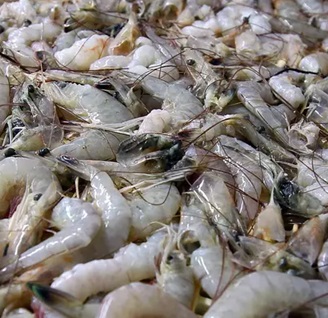 Louisiana’s shrimp industry, an essential part of the state’s economy and cultural identity, is under serious threat. A flood of cheap imported shrimp is driving prices to record lows, leaving local shrimpers fighting to survive. Without swift action, this generations-old way of life could vanish, taking with it jobs, traditions, and a vital piece of Louisiana’s coastal economy. Family-owned shrimping businesses, often passed down through generations, are struggling to stay afloat. The combination of plummeting prices and rising costs is forcing many to consider leaving the industry altogether. The potential collapse of the shrimping industry would devastate coastal towns like Grand Isle, Delcambre, and Pointe à la Hache, where much of the local economy depends on shrimping.
Louisiana’s shrimp industry, an essential part of the state’s economy and cultural identity, is under serious threat. A flood of cheap imported shrimp is driving prices to record lows, leaving local shrimpers fighting to survive. Without swift action, this generations-old way of life could vanish, taking with it jobs, traditions, and a vital piece of Louisiana’s coastal economy. Family-owned shrimping businesses, often passed down through generations, are struggling to stay afloat. The combination of plummeting prices and rising costs is forcing many to consider leaving the industry altogether. The potential collapse of the shrimping industry would devastate coastal towns like Grand Isle, Delcambre, and Pointe à la Hache, where much of the local economy depends on shrimping.
more,>>CLICK TO READ<< 08:52
South Carolina shrimpers applaud decision to impose duties on shrimp imported from four countries
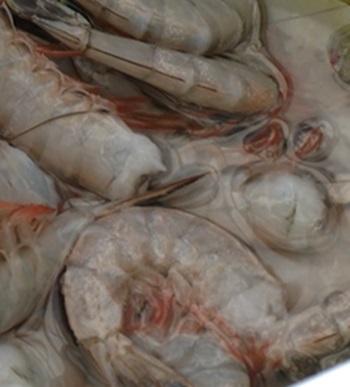 South Carolina shrimpers are celebrating the U.S. International Trade Commission’s recent decision to crack down on frozen shrimp imports from four countries. The ITC voted in favor of issuing countervailing duties on frozen, warm-water shrimp imports from Ecuador, India, and Vietnam after the U.S. Department of Commerce determined those governments were illegally subsidizing the industry. “We’re grateful because it’s an acknowledgment of what we feel and we experience in the industry and we see on a daily basis,” said Bryan Jones, a first-generation shrimper who lives in McClellanville. Jones serves as vice president of the South Carolina Shrimpers Association and was among a group of commercial fishermen who testified before the ITC in Washington, D.C. in October. more, >>CLICK TO READ<< 14:20
South Carolina shrimpers are celebrating the U.S. International Trade Commission’s recent decision to crack down on frozen shrimp imports from four countries. The ITC voted in favor of issuing countervailing duties on frozen, warm-water shrimp imports from Ecuador, India, and Vietnam after the U.S. Department of Commerce determined those governments were illegally subsidizing the industry. “We’re grateful because it’s an acknowledgment of what we feel and we experience in the industry and we see on a daily basis,” said Bryan Jones, a first-generation shrimper who lives in McClellanville. Jones serves as vice president of the South Carolina Shrimpers Association and was among a group of commercial fishermen who testified before the ITC in Washington, D.C. in October. more, >>CLICK TO READ<< 14:20
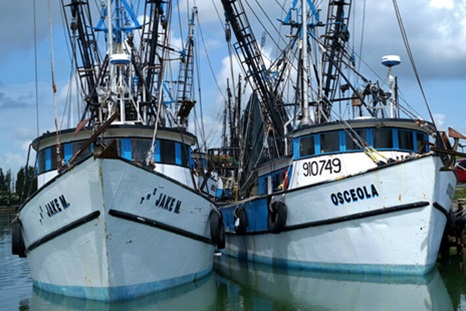
Struggling Valley shrimpers receive good news on new import measures
In an industry where bad news is the norm, shrimpers in Texas and elsewhere in the United States finally have a sliver of good news. The U.S. International Trade Commission, or ITC, on Tuesday determined that the U.S. shrimp industry is being “materially injured” by imports of frozen warm-water shrimp from Indonesia that the U.S. Department of Commerce says are being sold in this country at less than fair value, and also by shrimp imports from Ecuador, India and Vietnam that the Commerce Department says are being subsidized by the governments of those countries. As a result of the ITC’s determinations, the Commerce Department will issue “countervailing duty orders on imports of this product from Ecuador, India and Vietnam and an anti-dumping duty order on imports of this product from Indonesia,” the ITC announced Tuesday. more, >>CLICK TO READ<< 11:57
U.S. International Trade Commission votes in favor of antidumping, countervailing duties on shrimp imports
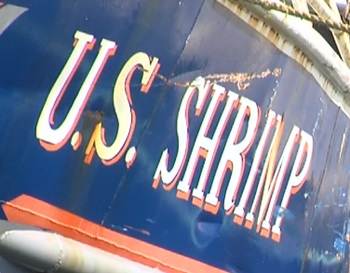 Southeast Texas fishermen are celebrating a win after the U.S. International Trade Commission voted in favor of antidumping and countervailing duties on shrimp imports from four countries. On Wednesday morning, the U.S. International Trade Commission voted in favor of antidumping and countervailing duty petitions filed by the American Shrimp Processors Association against imports of frozen warm-water shrimp from Ecuador, India, Indonesia, and Vietnam. As a result of the commission’s vote, duties ranging from 2.84% to 221.82% will be imposed on imports of shrimp from the four countries. “We are thrilled with the outcome of today’s vote,” said Trey Pearson, president of ASPA. more, >>CLICK TO READ<< 13:19
Southeast Texas fishermen are celebrating a win after the U.S. International Trade Commission voted in favor of antidumping and countervailing duties on shrimp imports from four countries. On Wednesday morning, the U.S. International Trade Commission voted in favor of antidumping and countervailing duty petitions filed by the American Shrimp Processors Association against imports of frozen warm-water shrimp from Ecuador, India, Indonesia, and Vietnam. As a result of the commission’s vote, duties ranging from 2.84% to 221.82% will be imposed on imports of shrimp from the four countries. “We are thrilled with the outcome of today’s vote,” said Trey Pearson, president of ASPA. more, >>CLICK TO READ<< 13:19

Donald Trump Pledges to Halt Big Wind Subsidies
Donald Trump’s election victory is quickly taking the wind out of the Biden administration’s ambitious renewables initiatives. President-elect Trump promised to end federal subsidies for offshore wind projects on his first day in office. As with many of his campaign pledges, Americans wait to see whether he will deliver. However, the market did not wait to see. Stock prices of offshore wind developers and turbine makers moved sharply downward following election day as investors query whether windmill projects are economically viable without the hefty federal subsidies Trump has promised to terminate. Environmental groups and fishermen have also raised concerns about the potential ecological trade-offs of this plastic-based technology and worries about ecotoxins created in the manufacturing of solar panels and EVs have caused consumers to pause. more, >>CLICK TO READ<< 10:22
Lawmakers demand review of U.S. Government Accountability Office’s oversight of shrimp imports
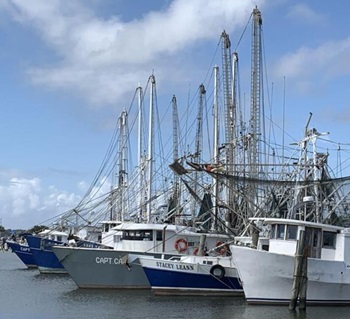 House Committee on Oversight and Accountability Chairman James Comer, R-Ky., U.S. Rep. Clay Higgins, R-La., and U.S. Rep. Troy Nehls, R-Texas, are calling on the U.S. Government Accountability Office to scrutinize whether the U.S. Treasury Department is fulfilling its legal obligation to protect American industries, including the shrimping sector, from international competition. The representatives voiced concerns in a letter sent to the GAO, suggesting that the Treasury may be neglecting statutory requirements that compel the department to oppose foreign economic assistance projects that could harm U.S. industries. more, >>CLICK TO READ<< 08:17
House Committee on Oversight and Accountability Chairman James Comer, R-Ky., U.S. Rep. Clay Higgins, R-La., and U.S. Rep. Troy Nehls, R-Texas, are calling on the U.S. Government Accountability Office to scrutinize whether the U.S. Treasury Department is fulfilling its legal obligation to protect American industries, including the shrimping sector, from international competition. The representatives voiced concerns in a letter sent to the GAO, suggesting that the Treasury may be neglecting statutory requirements that compel the department to oppose foreign economic assistance projects that could harm U.S. industries. more, >>CLICK TO READ<< 08:17
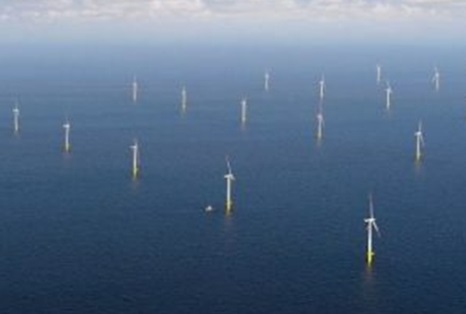
GOP Lawmakers, Fishermen Urge Trump to Keep Promise to Axe Offshore Wind
Trump’s return to the Oval Office may deal the problem-riddled offshore wind industry another blow if his administration follows through on his pledge to scrap federal support for offshore wind projects during his second term. Republican lawmakers, opposed to heavily subsidized green energy, and commercial fishermen, who view the industry as an existential threat to their livelihoods, are calling on the president-elect to follow through on his campaign’s promise, which could imply ending federal subsidies and lease sales for the industry. “The incoming administration has an historic opportunity to save American workers from foreign developers, reinvigorate iconic coastal towns, and improve America’s food security,” NEFSA CEO Jerry Leeman said in a press release following Trump’s election win. more, >>CLICK TO READ<< 06:54
Charting a course toward seafood independence for Alaska’s vulnerable food systems
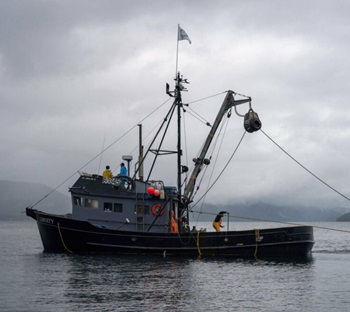 As a commercial fisherman based in Sitka and the executive director of the Alaska Longline Fishermen’s Association (ALFA), I’ve spent decades navigating Alaska’s challenging waters and the headwinds facing our fishing communities. Alaska’s coastal residents are resilient, but they are up against a new magnitude of challenges. The loss of fishing access and community-based processing capacity, along with a dearth of local markets for seafood, are straining once vibrant fishing economies up and down our coastline. I recently contributed to a fisheries access report commissioned by the Alaska Sustainable Fisheries Trust (ASFT), which highlights the outmigration of fishing access in Southeast Alaska. Communities with historically robust local fishing fleets now see few active vessels based in town. This trend is acute in communities such as Kake, which has lost its local processor — and with it, a viable market for resident fishermen. Through interviews and in-person engagement, ASFT’s report found that a common concern among fishermen was the loss of a local fish buyer. When this happens, resident fishermen often sell their permits or abandon fishing altogether. more, >>CLICK TO READ<< By Linda Behnken 12:05
As a commercial fisherman based in Sitka and the executive director of the Alaska Longline Fishermen’s Association (ALFA), I’ve spent decades navigating Alaska’s challenging waters and the headwinds facing our fishing communities. Alaska’s coastal residents are resilient, but they are up against a new magnitude of challenges. The loss of fishing access and community-based processing capacity, along with a dearth of local markets for seafood, are straining once vibrant fishing economies up and down our coastline. I recently contributed to a fisheries access report commissioned by the Alaska Sustainable Fisheries Trust (ASFT), which highlights the outmigration of fishing access in Southeast Alaska. Communities with historically robust local fishing fleets now see few active vessels based in town. This trend is acute in communities such as Kake, which has lost its local processor — and with it, a viable market for resident fishermen. Through interviews and in-person engagement, ASFT’s report found that a common concern among fishermen was the loss of a local fish buyer. When this happens, resident fishermen often sell their permits or abandon fishing altogether. more, >>CLICK TO READ<< By Linda Behnken 12:05
Southern Shrimp Alliance Welcomes NOAA Fisheries’ Confirmation that U.S. Wild-Caught Shrimp Is the Sustainable Choice
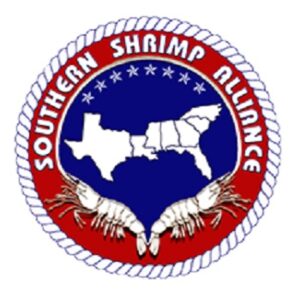 Last week, NOAA Fisheries published an on-line resource with facts regarding wild-caught American shrimp, explaining what makes it a sustainable seafood choice. Shrimp is, far and away, the most popular seafood in America. As NOAA Fisheries explains, “now about one-quarter of the seafood Americans eat is shrimp.” Yet, despite Americans’ love of shrimp, the U.S. shrimp industry is struggling. NOAA Fisheries notes that despite the fact that landings volumes were roughly the same in 2023 as they were in 2022, preliminary data from the Gulf of Mexico show that the industry sold $329 million of wild-caught shrimp in 2022 and that revenue dropped to $204 million in 2023 – a 38 percent drop.” more, >>CLICK TO READ<< 16:29
Last week, NOAA Fisheries published an on-line resource with facts regarding wild-caught American shrimp, explaining what makes it a sustainable seafood choice. Shrimp is, far and away, the most popular seafood in America. As NOAA Fisheries explains, “now about one-quarter of the seafood Americans eat is shrimp.” Yet, despite Americans’ love of shrimp, the U.S. shrimp industry is struggling. NOAA Fisheries notes that despite the fact that landings volumes were roughly the same in 2023 as they were in 2022, preliminary data from the Gulf of Mexico show that the industry sold $329 million of wild-caught shrimp in 2022 and that revenue dropped to $204 million in 2023 – a 38 percent drop.” more, >>CLICK TO READ<< 16:29

Trump Defeats Harris to Win a Second White House Term
Former President Donald Trump was elected the 47th president of the United States on Wednesday, mounting one of the greatest political comebacks of all time – a convicted felon who was twice impeached and left the presidency in disgrace just four years ago, only to win it back decisively in one of the most fraught elections in modern history. In defeating Vice President Kamala Harris, Trump stitched together an improbable coalition of supporters, including people of color and young voters, while promising to unfurl an America-first vision. With his victory all but assured early Wednesday morning, Trump told cheering supporters at a convention center in West Palm Beach, Florida, that “this was a movement like nobody’s ever seen before.” more, >>CLICK TO READ<< 07:41
Athearn Marine Agency Boat of the Week: 62′ Turnkey Fiberglass Dragger, Cat 3408
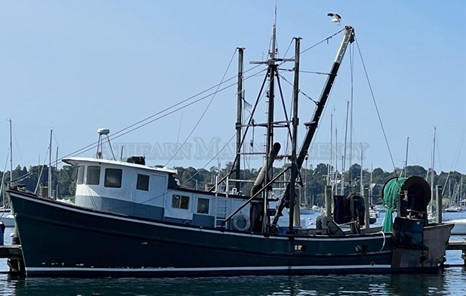 To review specifications, information, with 25 photos’,>click here< To see all the boats in this series, >click here<. 06:24
To review specifications, information, with 25 photos’,>click here< To see all the boats in this series, >click here<. 06:24
South Carolina shrimpers are in troubled waters. Here’s how the industry is seeking relief
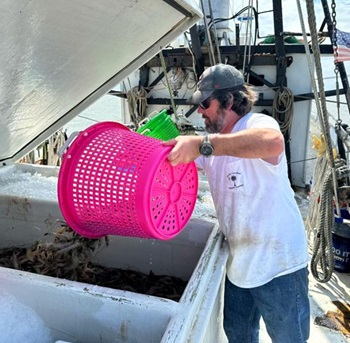 South Carolina shrimpers are in a fight for their industry’s future. Facing pressures from foreign countries shipping in cheap, frozen catches in abundance, domestic shrimpers have been unable to compete. Bryan Jones is a first-generation shrimper in McClellanville. Before his life became centered around nets and saltwater and fresh catch, he was a vice president of a wealth management firm in Florida. The work is exhausting and the days on the deck of his trawler, the Pamela Sue, are long, Jones said. There are risks involved with shrimping — financial, environmental, physical — but he saw an opportunity to create a livelihood for his family and couldn’t resist. He joins at a time when fishermen are struggling, and more are deciding to leave the trade altogether. “The average age of a shrimp boat captain, I believe, is 65,” Jones said. “What we need is an injection of youth in the industry to sustain it.” Photos, more, >>CLICK TO READ<< 11:21
South Carolina shrimpers are in a fight for their industry’s future. Facing pressures from foreign countries shipping in cheap, frozen catches in abundance, domestic shrimpers have been unable to compete. Bryan Jones is a first-generation shrimper in McClellanville. Before his life became centered around nets and saltwater and fresh catch, he was a vice president of a wealth management firm in Florida. The work is exhausting and the days on the deck of his trawler, the Pamela Sue, are long, Jones said. There are risks involved with shrimping — financial, environmental, physical — but he saw an opportunity to create a livelihood for his family and couldn’t resist. He joins at a time when fishermen are struggling, and more are deciding to leave the trade altogether. “The average age of a shrimp boat captain, I believe, is 65,” Jones said. “What we need is an injection of youth in the industry to sustain it.” Photos, more, >>CLICK TO READ<< 11:21
Is U.S. Wild-Caught Shrimp Sustainable? The Short Answer Is Yes
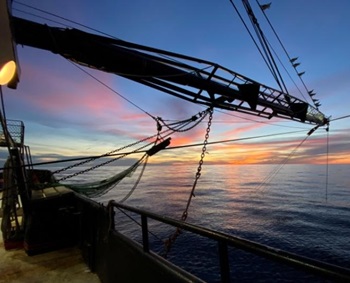 U.S.-harvested shrimp is nutritious, delicious… and sustainable! The shrimp fishery has also historically been a culturally important economic engine. It provides a livelihood for thousands of U.S. commercial fishermen. U.S. shrimp are a sustainable seafood option, and the United States sets a global precedent for shrimp trawl bycatch reduction. But our nation’s shrimp industry is struggling to stay afloat and there’s confusion about its sustainability. Here are the facts about U.S. wild-caught shrimp. Most U.S. shrimp are caught in the Southeast from Texas to North Carolina. Three species—white shrimp, pink shrimp, and brown shrimp—make up the vast majority of the shrimp caught. more, >>CLICK TO READ<< 10:22
U.S.-harvested shrimp is nutritious, delicious… and sustainable! The shrimp fishery has also historically been a culturally important economic engine. It provides a livelihood for thousands of U.S. commercial fishermen. U.S. shrimp are a sustainable seafood option, and the United States sets a global precedent for shrimp trawl bycatch reduction. But our nation’s shrimp industry is struggling to stay afloat and there’s confusion about its sustainability. Here are the facts about U.S. wild-caught shrimp. Most U.S. shrimp are caught in the Southeast from Texas to North Carolina. Three species—white shrimp, pink shrimp, and brown shrimp—make up the vast majority of the shrimp caught. more, >>CLICK TO READ<< 10:22
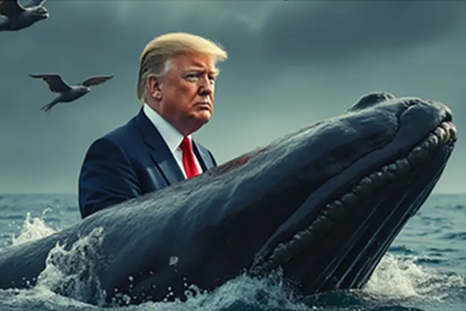
New Report Suggests “Whale Psychiatrist” Trump May be Right About Wind Farms and Whales
US Bureau of Ocean Management report says whales, dolphins, birds and bats can all be injured by wind turbine construction, and offshore fishing harmed. Trump has been an advocate for keeping America clean and healthy. He has not advocated for the anti-carbon push based on pseudoscience and the rush into green energy projects put forth by environmentalists. Admittedly. the National Oceanic and Atmospheric Administration (NOAA) has officials saying they have found no evidence linking offshore wind turbines to whale deaths. However, a new report from the U.S. Bureau of Ocean Energy Management (BOEM) has just released a new report that said whales, dolphins, birds and more can be exposed to “unavoidable adverse impacts” by the construction of offshore wind farms. more, >>CLICK TO READ<< 08:50
New Federal Report: Offshore Wind Farm Construction Can Harm Whales, Birds, Fisheries – >>CLICK TO READ<<
WHALES DECLARE BOEM IS A TERRORIST ORGANIZATION COMMITTING GENOCIDE By Jim Lovgren
 In a press release issued today by the AAA, an aquatic coalition of many different marine creatures, it was declared that the United States Bureau of Ocean Energy Management was a terrorist organization intent on the extermination of all marine mammals and other sea life. The National Marine Fishery Service was named as a co-conspirator, for standing by and watching, instead of doing their legally required job of protecting endangered species. The AAA, Aquatic Animals Association, is a newly formed coalition of different marine species including Whales, Dolphins, Turtles, fish, clams, and scallops. Despite the vast disparity in their abilities to communicate with each other, they have combined each other’s unique communication forms into one voice in hopes of saving themselves from extinction. From Harvey Haddock, President, Aquatic Animal Association. more, >>CLICK TO READ<< 17:14
In a press release issued today by the AAA, an aquatic coalition of many different marine creatures, it was declared that the United States Bureau of Ocean Energy Management was a terrorist organization intent on the extermination of all marine mammals and other sea life. The National Marine Fishery Service was named as a co-conspirator, for standing by and watching, instead of doing their legally required job of protecting endangered species. The AAA, Aquatic Animals Association, is a newly formed coalition of different marine species including Whales, Dolphins, Turtles, fish, clams, and scallops. Despite the vast disparity in their abilities to communicate with each other, they have combined each other’s unique communication forms into one voice in hopes of saving themselves from extinction. From Harvey Haddock, President, Aquatic Animal Association. more, >>CLICK TO READ<< 17:14
Right whale population grows 4%, but extinction remains a threat
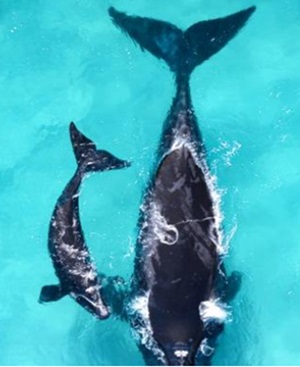 Conservationists are calling on the government, shipping and fishing industries to save the North Atlantic right whale from extinction despite an increase in its population. Researchers studying the whales said this week that the population increased to an estimated 372 in 2023. That’s an increase of about four percent from 2020, and “heartening news” after the whale’s population fell by about 25 percent from 2010 to 2020. The population of the right whale, which can weigh up to 150,000 pounds (68,039 kilograms) and lives off the East Coast, plummeted in the 2010s. Stressed by global warming and vulnerable to ship collisions and entanglement in fishing gear, their numbers fell to fewer than 360 by the early 2020s. more, >>CLICK TO READ<< 12:29
Conservationists are calling on the government, shipping and fishing industries to save the North Atlantic right whale from extinction despite an increase in its population. Researchers studying the whales said this week that the population increased to an estimated 372 in 2023. That’s an increase of about four percent from 2020, and “heartening news” after the whale’s population fell by about 25 percent from 2010 to 2020. The population of the right whale, which can weigh up to 150,000 pounds (68,039 kilograms) and lives off the East Coast, plummeted in the 2010s. Stressed by global warming and vulnerable to ship collisions and entanglement in fishing gear, their numbers fell to fewer than 360 by the early 2020s. more, >>CLICK TO READ<< 12:29
Gov. DeSantis Announces $1 Million To Rebuild Fishing, Aquaculture Infrastructure Damaged By Hurricanes
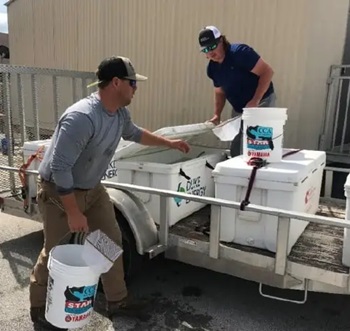 Governor Ron DeSantis announced today the allocation of $1,000,000 from the Florida Disaster Fund to the Fish and Wildlife Foundation of Florida. The funding will be used to repair fishing and aquaculture infrastructure in the Big Bend region that was severely damaged by Hurricanes Helene and Milton. “The Big Bend’s fishing industry took a direct hit from hurricanes Debby and Helene, and so did the hardworking Floridians who make their living on the water,” said Governor Ron DeSantis. “Today’s investments will help to rebuild critical waterside infrastructure and help get Floridians in the fishing and aquaculture industries back to full operations.” more, >>CLICK TO READ<< 08:09
Governor Ron DeSantis announced today the allocation of $1,000,000 from the Florida Disaster Fund to the Fish and Wildlife Foundation of Florida. The funding will be used to repair fishing and aquaculture infrastructure in the Big Bend region that was severely damaged by Hurricanes Helene and Milton. “The Big Bend’s fishing industry took a direct hit from hurricanes Debby and Helene, and so did the hardworking Floridians who make their living on the water,” said Governor Ron DeSantis. “Today’s investments will help to rebuild critical waterside infrastructure and help get Floridians in the fishing and aquaculture industries back to full operations.” more, >>CLICK TO READ<< 08:09
Athearn Marine Agency Boat of the Week: 70′ Williams Shrimp Trawler
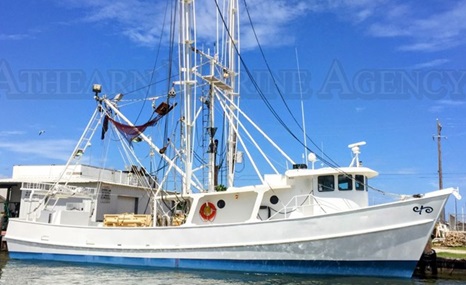 To review specifications, information, and 46 photos’,>click here< To see all the boats in this series, >click here< 06:24
To review specifications, information, and 46 photos’,>click here< To see all the boats in this series, >click here< 06:24
New bill to expand federal relief eligibility for fishing/shrimping industry
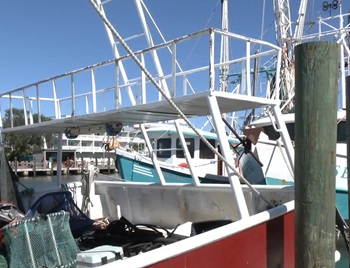 “The influx of imported shrimp has resulted in the decline of our fleets and massive job losses and our local businesses are devastated,” said Bryan Jones, the Vice President of the South Carolina Shrimper’s Association. Standing in front of the shrimp boats of Shem Creek, US Congresswoman Nancy Mace (R) introduced the Protect American Fisheries Act on Friday. “Foreign dumping of shrimp filled with contaminants that don’t meet US safety standards is undercutting honest, hardworking, American fisherman,” said Congresswoman Mace. The bipartisan bill proposes to amend the Magnuson-Stevens Fishery Conservation and Management Act to include “economic causes” as a reason for declaring a fishery resource disaster. Video, more, >>CLICK TO READ<< 06:58
“The influx of imported shrimp has resulted in the decline of our fleets and massive job losses and our local businesses are devastated,” said Bryan Jones, the Vice President of the South Carolina Shrimper’s Association. Standing in front of the shrimp boats of Shem Creek, US Congresswoman Nancy Mace (R) introduced the Protect American Fisheries Act on Friday. “Foreign dumping of shrimp filled with contaminants that don’t meet US safety standards is undercutting honest, hardworking, American fisherman,” said Congresswoman Mace. The bipartisan bill proposes to amend the Magnuson-Stevens Fishery Conservation and Management Act to include “economic causes” as a reason for declaring a fishery resource disaster. Video, more, >>CLICK TO READ<< 06:58
Hurricane Milton carves a path of destruction across Florida; millions without power or water
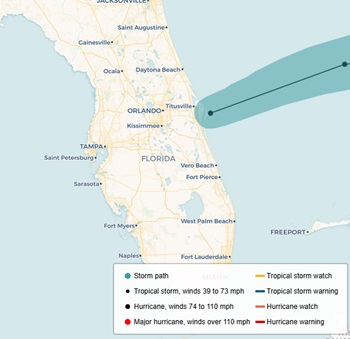 Millions of Floridians from coast to coast are assessing the overnight destruction left by Hurricane Milton, which made landfall at Siesta Key off Sarasota as a Category 3 storm at around 8:30 p.m. Wednesday, punched across the state and exited the east coast near Cape Canaveral before dawn Thursday. At least 2.6 million homes and businesses were without power, St. Petersburg residents without water, and major damage was done in the Tampa area, where flash flood warnings were still in effect Thursday. St. Petersburg residents also could no longer get water from their household taps because a water main break led the city to shut down service. St. Petersburg recorded over 16 inches of rain. Video, more, >>CLICK TO READ<< 06:50
Millions of Floridians from coast to coast are assessing the overnight destruction left by Hurricane Milton, which made landfall at Siesta Key off Sarasota as a Category 3 storm at around 8:30 p.m. Wednesday, punched across the state and exited the east coast near Cape Canaveral before dawn Thursday. At least 2.6 million homes and businesses were without power, St. Petersburg residents without water, and major damage was done in the Tampa area, where flash flood warnings were still in effect Thursday. St. Petersburg residents also could no longer get water from their household taps because a water main break led the city to shut down service. St. Petersburg recorded over 16 inches of rain. Video, more, >>CLICK TO READ<< 06:50






